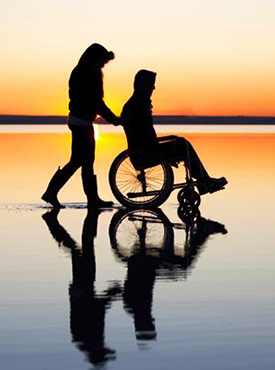2017 Dec 3
December 3rd commemorates the International Day of Persons with Disabilities. It came into effect in the year 1992 but has been a concept used for much longer (International Year of Disabled Persons-1981 and International Decade of Disabled Persons-1983 to 1992).
With a World Report (2011) of 1 billion people with disabilities, the day is supposed to raise awareness on the current conditions for such people and how they can be improved in aspects of human rights, health and accessibility for the future.
400 million disabled people are said to live in developing countries alone. A 2006 census in Lanka showed 7% of the population to be disabled and yet there is very little being done to cater to their needs. The National Council for Persons with Disabilities (NCPD) has been in use since 1996 but with very poor results. With the Ministry of Health (2014) stating a probable 24.2% increase in disabled persons by 2040, it was a minor victory when the United Nation’s Convention on the Rights of Persons with Disabilities (CRPD) took the reins in 2016 after noticing what poor development had been taking place after the 1996 Act. But there is yet a long way to go in implementing change.
The main rights planned to be implemented by the CRPD were the rights to accessibility, protection, healthcare, education, employment plus political and social participation. Now, a rather stereotyped view is that disabled people are only those with physical abnormalities or those restricted to wheelchairs.
A disability is a condition that interferes with not only physical aspects but also mental and sensory aspects of life. With regard to accessibility problems, this could mean lack of ramps, handicapped bathrooms in public properties or perhaps even a deaf person struggling to get information at public properties without a sign language interpreter.
Another very troublesome aspect is public transport, which for some individuals is the only type of transport that can be afforded. So when that bus driver speeds from one stop to another leaving people to either cram inside or get left behind, it actually makes getting in the bus itself a difficult and dangerous process for the physically disabled. Furthermore, costs of good quality aids for people in need are absurdly high and unaffordable. Grounds for such accessibility should be set in humane ways that will be realistically affordable, available and safe for those who are in need of it.
Lack of education is a glaring problem. A survey in 2011 showed an unforgivable 34% of children with disabilities not receiving primary education, which soon increased to 40% in 2012. In keeping with such numbers there should be a re-evaluation of the education system. Most disabled children are more often misunderstood for being intellectually challenged and not given a proper education. More often, with the right applications (eg.Braille, sign language), these children could be just as smart if not more so than the rest. It is only a matter of training and employing teachers skilled in such fields and having access to adequate resources (Braille textbooks). Furthermore, for those who are intellectual disabled, once again appropriate training in teachers is a must.
Discrimination against people with disabilities is extremely high in Sri Lanka, especially with regards to employment. As of 2012 it was shown that 70.9% of people with disabilities are unemployed. Despite the 1996 Act and the National Employment Policy of 2002 ensuring government-provided opportunities, such a thing is clearly not being implemented. This discrimination along with a lack of education makes it near impossible for employment to occur. Who are we to deny such opportunities to those who so desperately want/need it?
In political and health care aspects, there are many insensitive processes to be improved upon. As mentioned above accessibility is an important factor for people with disabilities. If physically disabled are not given the proper access to public properties such as hospitals and polling centers (a ramp being a main example) this would lead to either neglect towards the individual or neglect towards society. It is a case of common courtesy.
There are quite a few organizations in Sri Lanka dedicated to standing up for the rights of disabled people-for example, the Brighter Life Foundation, Rehab Lanka and International Centre for Ethnic Studies. But it is simply not enough. It would take some serious government interference to see to these issues, and such dedication to these tasks are glaringly lacking, which is why each year awareness is spread on these issues so the resources to tackle these problems will slowly be built up. However, progress is going along too slowly.
It is imperative to understand that being disabled doesn’t make a man or woman any less of a human being. Each person in accordance with their rights deserves basic functions and resources such as healthcare and education and unless intellectually incapable (which more often isn’t the case, it’s just a lack of education) a right to employment as well. Legally, Sri Lanka has obligations to act upon. It’s now a matter of implementing and enforcing the change.







